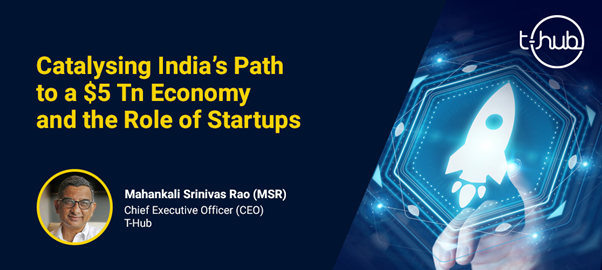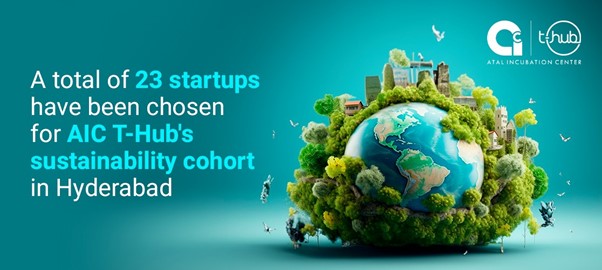India’s startup ecosystem has witnessed remarkable growth in recent years, ranking as the third largest globally. Indian startups are attracting investors around the world. In 2022 alone, the country received an impressive $42 Bn in venture capital funding, which is a significant increase from the $16 Bn in 2021. It demonstrates the confidence of investors in Indian startups and their role in India’s growth.
The Indian government has been proactive in supporting the startup ecosystem through various initiatives, such as Startup India and the National Startup Ranking, to create a favourable environment for startups. These initiatives provide the necessary support and resources to startups, encouraging innovation and entrepreneurship in the country.
Indian startups have been at the forefront of innovation across multiple sectors, including healthcare, education, ecommerce and financial technology. Their disruptive solutions are addressing critical challenges and transforming industries and are not limited to domestic markets.
The rise in funding from foreign investors indicates their growing presence and global ambition. Startups contribute to the overall economic growth of India and the ecosystem has the potential to contribute four to five per cent to the country’s gross domestic product (GDP) over the next three to five years.
Startups Are Job Creators And Innovators
One of the significant contributions of startups is job creation. In the last five years, the total number of jobs created by startups has crossed nine lakhs. In 2022 alone, startup job creation rose by 36% creating over 269K+ jobs.
Many of these jobs are being created in tier 2 and tier 3 cities, which account for 48% of Indian startups. In the coming years, these numbers are projected to increase as the ecosystem continues to expand.
Innovation is another key aspect where startups excel. These entrepreneurial ventures are at the forefront of developing new products and services that cater to the specific needs of Indian consumers. By introducing innovative solutions, startups improve the lives of millions of Indians while also bolstering the
Indian economy.
Startups play a significant role in strengthening India’s export sector as well. According to estimates, India’s software services exports witnessed a notable increase of 17.2%, reaching $156.7 Bn during the period of 2021-22.
It is anticipated that in FY23, India’s total goods and services exports will surpass $ 760 Bn, with a major contribution from merchandise and service exports. As startups progressively expand their global operations, it is predicted that these figures will further rise, bolstering India’s international trade.

India-U.S. Partnership To Benefit The Indian Startup Ecosystem
Indian startups have reason to celebrate the recent visit of Indian Prime Minister Narendra Modi to the U.S. The bilateral trade and investment partnership between the U.S. and India surpassed $191 Bn in 2022, indicating a strengthening of business relations. The defence and business deals struck can enhance engagement and technical cooperation in emerging technologies, clean energy and pharmaceuticals. The launch of a grant programme worth $2 Mn under the U.S.-India Science and Technology Endowment Fund for the joint development and commercialisation of Artificial Intelligence (AI) and quantum technologies is a significant development for Indian startups.
This is apart from the 35 innovative joint research collaborations in emerging technologies, funded by the U.S. National Science Foundation (NSF) and the Indian Department of Science and Technology (DST) that will also help shape the innovative solutions coming from Indian startups.
The establishment of the U.S.-India Defence Acceleration Ecosystem (INDUS-X) is another important step for Indian startups. INDUS-X is a network comprising universities, startups,industry players and think tanks. It will facilitate joint defence technology innovation and promote the co-production of advanced defence technology between the two countries.Startups incubated at Indian startup accelerators, including T-Hub, are a part of this network. These initiatives are bound to have a positive impact on India’s journey to a $5 Tn economy.

Road To A Sustainable Economy
While the Indian startup ecosystem has witnessed tremendous growth, it’s not without its own share of challenges. The need for patient capital, addressing long-term capital gains on unlisted equity and resolving taxation issues are some of the areas that require attention.
Sustained efforts are required from both the government and stakeholders to create an enabling environment for startups.
One major hurdle is the lack of skilled talent in specific areas like engineering, product management, and marketing. Although India has a vast and expanding pool of talent, the shortage of skilled professionals in these domains can pose difficulties for startups seeking to secure the necessary expertise to fuel their growth.
The ecosystem’s growth, fueled by increased funding, government support and innovation, has positioned India as a prominent player in the global startup landscape. With collaboration between India and the U.S. on the rise, the startup ecosystem is poised for further expansion and international success.
The Indian startup ecosystem offers numerous opportunities for investment and participation in the growth story of India’s economy.







